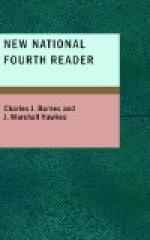“Are you coming back again?”
Fill blanks in the following statements.
Questions which may be answered by yes or no, regularly require the —— inflection.
Questions which can not be answered by yes or no, regularly require the —— inflection.
* * * * *
Language Lesson. Let pupils copy the following words.
seize chief grief fear beach receive
relief believe weary beacon
Write sentences, each containing one of the preceding words, used in such a way as to show its meaning.
* * * * *
LESSON LIV.
ob’sti nate, determined to have one’s own way.
vi’cious, not well tamed; given to bad tricks.
sub dued’, made gentle; overcome.
swerve, turn from a direct line.
squad’ron, a number of horses drawn up together.
pli’able, capable of being turned or bent.
strove, attempted; tried hard.
ex ceed’ed, went beyond.
thong, a long strip of leather.
* * * * *
WILD HORSES OF SOUTH AMERICA.
At the time of the discovery of America there were no wild horses in any part of the continent.
Soon, however, some of the horses brought over from Europe by the early settlers, wandered away, and now wild horses are to be met with in large numbers, in some cases as many as a thousand at a time.
They appear to be under the command of a leader, the strongest and boldest of the herd, whom they obey.
When threatened with danger, at some signal, understood by them all, they either close together and trample their enemy to death, or form themselves into a circle and welcome him with their heels.
The leader first faces the danger, and when he finds it prudent to retreat, all follow his rapid flight.
Byron thus describes a troop of wild horses:
“A trampling troop; I see them come!
In one vast squadron they advance!
I strove to cry—my lips were
dumb.
The steeds rush on in plunging pride;
But where are they the reins to guide?
A thousand horse—and none to
ride!
With flowing tail, and flying mane,
Wide nostrils—never stretch’d
by pain,
Mouths bloodless to the bit or rein
And feet that iron never shod,
And flanks unscarr’d by spur or
rod,
A thousand horse, the wild, the free,
Like waves that follow o’er the
sea.
On came the troop....
They stop—they start—they
snuff the air,
Gallop a moment here and there,
Approach, retire, wheel round and round,
Then plunging back with sudden bound,
They snort—they foam—neigh—swerve
aside,
And backward to the forest fly.”




